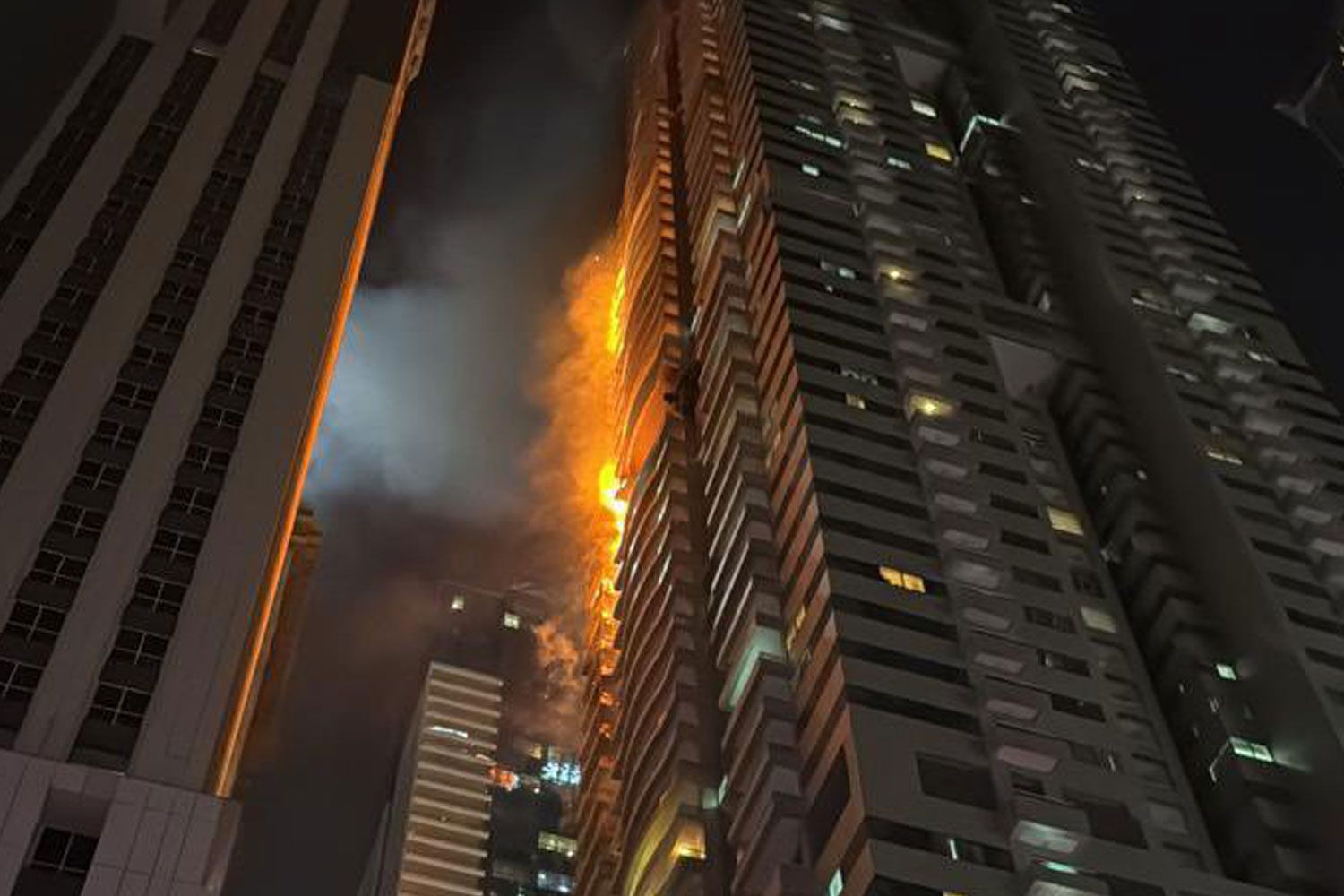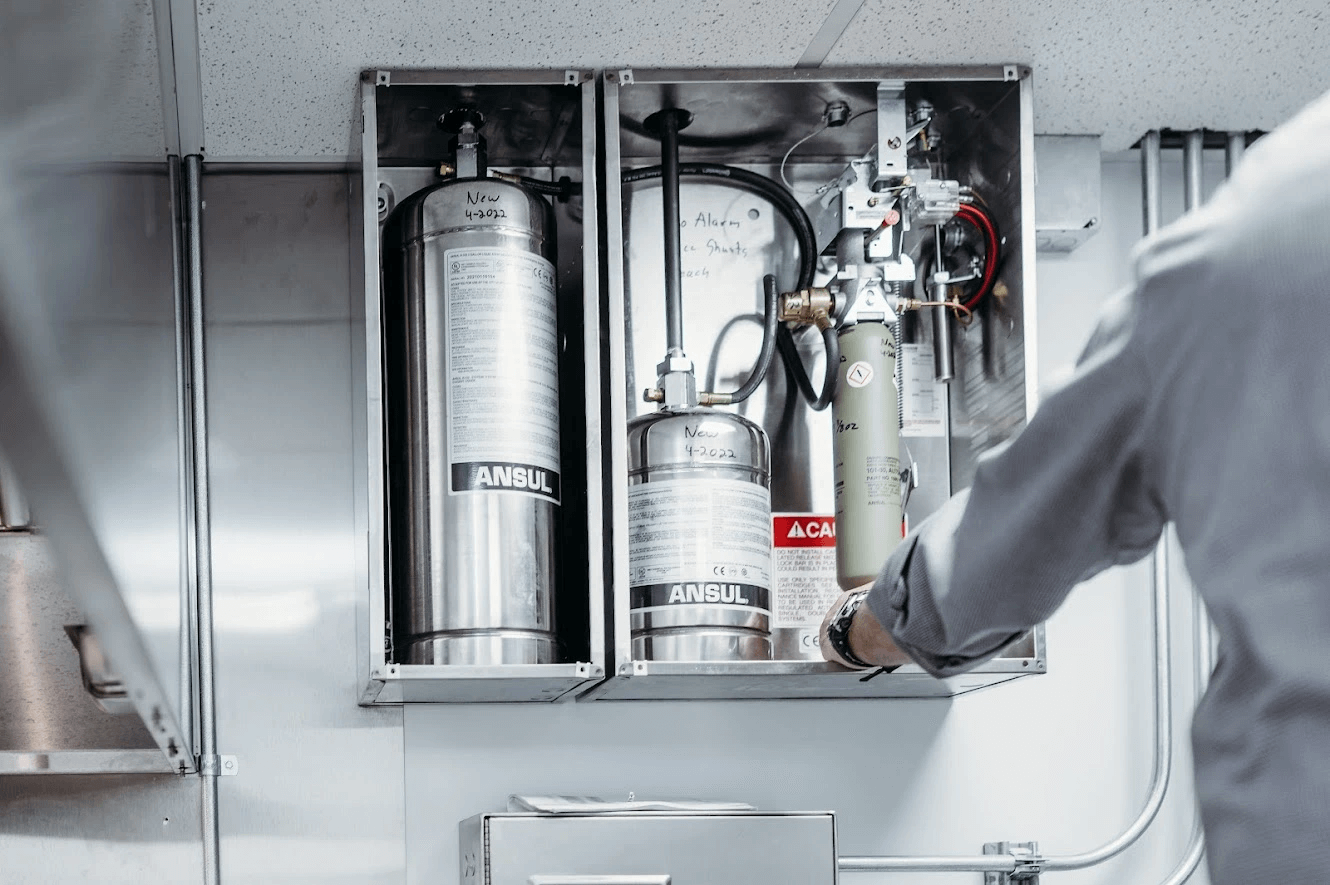A fire alarm system installation doesn’t start with detectors or a control panel… it starts with a single question that could protect an entire building or leave it defenseless:
Is the system designed for early fire detection before humans even see the danger?
Fire alarm systems are not merely a compliance formality; they are early warning networks designed to detect danger in seconds and trigger an alarm, evacuation, and immediate response according to the building safety standards in Dubai.
Any error in the fire alarm design or execution can result in:
❌ Delayed alarms.
❌ Ineffective emergency evacuation protocols.
❌ Total rejection of the DCD approval.
At Daem fire fighting contracting company, we handle fire alarm system services as an integrated engineering solution tailored to the building’s nature, risk level, and official certification requirements, not just as an off-the-shelf product.
🎯 In this article, we take you inside the world of fire alarm devices: how they work, their types, components, and certification standards in the UAE, with clarity, professionalism, and decisions built on knowledge.
Contact Us Now!
Your Project, Our Priority: Fast & Reliable Approvals
Table of Contents
what is fire alarm system?
A fire alarm system is fundamentally designed for the early detection of fire, smoke, and abnormal temperature spikes. It relies on a sophisticated network of sensors, such as manual call points and fire alarm system uae, which monitor hazards and transmit immediate signals to a central control panel.
This panel then triggers audible and visual alarms to alert occupants and precisely pinpoint the fire’s location.
This comprehensive smoke alarm system integrates seamlessly with other life safety measures, such as automatic fire suppression systems, to contain the spread of fire.
This coordination provides vital time for safe evacuation and significantly reduces potential losses in lives and property.

Understanding Fire Alarm Systems: Why They are Critical
A fire alarm system is an integrated network of sensors, control units, and alerting devices engineered to detect the earliest indications of fire, such as smoke, heat, flames, or gas, and promptly warn building occupants to evacuate. Its core functions are detection, signal processing, and notification.
At its core, the system performs three essential functions:
- Detection: Identifies a potential fire through one or more sensor types (e.g., smoke, heat, gas).
- Signal Processing: The control panel evaluates the signal and verifies the risk.
- Notification: Triggers visual and audible alerts (sirens, strobe lights) to prompt safe evacuation.
Beyond being a mandatory requirement under UAE Civil Defense regulations for most commercial and residential buildings, these systems are vital for:
- Preventing Human Casualties: Providing crucial time for safe evacuation.
- Minimizing Property Damage: Enabling early intervention to contain or extinguish fires.
- Ensuring Business Continuity: Protecting assets and infrastructure critical to operations.
- Reducing Insurance Liability: Demonstrating proactive risk management and compliance.
🧯 Protect lives and property with reliable fire alarm systems. Discover how home fire suppression systems from DAEM UAE provide complete safety for your building.
Core Components of a Fire Alarm System: An Overview
Fire alarm system components include fire detectors that sense smoke, heat, or gas, while the control panel processes these signals and activates notification appliances.
In addition, manual call points allow manual activation, a reliable power supply with battery backup ensures continuous operation, and the communication module connects to emergency services, together ensuring early detection, seamless performance, and immediate emergency response.

fire alarm components list:
- Fire Detectors: These are the primary sensors that identify early signs of fire (smoke, heat, flame, or gas) and transmit signals to the control panel.
- Fire Alarm Control Panel (FACP): Often referred to as the “brain,” the FACP receives, processes, and verifies signals from detectors, then initiates the appropriate responses.
- Notification Appliances: These devices (sirens, strobe lights, speakers) provide audible and visual warnings to prompt evacuation.
- Manual Call Points (MCPs): Wall-mounted boxes allowing occupants to manually activate the alarm in case of a visible fire.
- Power Supply and Battery Backup: Ensures continuous system operation even during power outages.
- Communication Module: Facilitates real-time alerts to emergency services or central monitoring stations.
Explore how The Vital Role of Fire Alarm Systems in Enhancing Building Safety Across the UAE is shaping safer communities and supporting compliance with UAE Civil Defense standards.
Main Types of Fire Alarm Systems: Choosing the Right Solution
The fire system alarm features 4 main types including: the conventional system which is the the basic type, the addressable system which is able to set the location of fire, the wireless system which is connected to the control panel via secure radio signals, and the last one is the intelligent system that is able to recognize the difference between an actual fire incident or other non-threatening situation like cooking smoke.
Fire alarm systems are not one-size-fits-all. Different building types and operational requirements necessitate specific system designs.
- Conventional Fire Alarm Systems: The most basic type, organizing detectors into zones. Ideal for smaller, simpler premises.
- Addressable Fire Alarm Systems: More advanced, providing unique digital addresses for each device, allowing for precise fire location. Best suited for larger, more complex buildings.
- Wireless Fire Alarm Systems: Utilize secure radio frequency communication, eliminating the need for extensive wiring. Perfect for historical sites or situations where wiring is challenging.
- Intelligent (Smart) Fire Alarm Systems: Advanced systems capable of analyzing signals to differentiate between actual fires and non-threatening conditions (e.g., cooking smoke), often integrating with Building Management Systems (BMS).
Learn the key differences between Conventional and Addressable Fire Alarm Systems and select the most effective fire safety solution for your facility.
Types of Fire Detectors: Precision in Early Warning
Fire Alarm Detectors Types include smoke, heat, flame, and gas detectors, each responding to specific fire indicators, while manual call points let people trigger alarms manually.
These systems ensure fast and reliable fire warning in homes, offices, industrial sites, and hazardous areas.
- Smoke Detectors: Respond to smoke particles, primarily through photoelectric (optical) or ionization technologies. Commonly used in offices, hotels, and residential areas.
- Heat Detectors: Activate when temperatures exceed a set threshold or rise rapidly. More reliable in dusty or steamy environments like kitchens and boiler rooms.
- Flame Detectors: Sense ultraviolet (UV) or infrared (IR) radiation emitted by flames. Critical in open or hazardous environments where fires can erupt swiftly.
- Gas Detectors: Detect flammable or toxic gases like carbon monoxide (CO) or methane. Essential in industrial zones, basements, or enclosed car parks.
- Manual Call Points (MCPs): Allow occupants to manually trigger the alarm, serving as a vital backup.
Combine advanced detectors with a professional Fire Suppression System installed by Daem Contracting Company for maximum safety.
How Fire Alarm Systems Function: Detection to Response
Fire alarm devices detect fire incidents, process the signals, alert occupants, and coordinate evacuation and suppression actions. These devices first identify fire indicators and send signals to the control panel, which evaluates the threat and triggers alarms, notifications, and integrated suppression systems to ensure rapid response and safety.
Here’s how a typical fire alarm system functions:
- Detection Phase: Sensors identify a fire indicator and transmit electrical signals to the control panel.
- Signal Processing Phase: The FACP evaluates the signals, distinguishing between genuine threats and false alarms in advanced systems.
- Notification Phase: Upon threat confirmation, the FACP activates sirens, strobe lights, and other alerts. Smart systems may also notify emergency responders directly.
- Evacuation & Response: Occupants follow evacuation plans, while integrated systems (e.g., sprinklers) may initiate suppression actions.
Compliance Standards and UAE Civil Defense Requirements
Adherence to local and international fire safety standards is non-negotiable in the UAE. Fire alarm systems must comply with UAE Civil Defense guidelines and internationally recognized benchmarks such as NFPA 72 to gain approval and ensure operational integrity.
- UAE Civil Defense Requirements: Dictate that systems must be installed by licensed, approved contractors, use certified components, include mandatory features (MCPs, alerts, battery backup), and undergo annual testing and maintenance with documented inspections.
- NFPA 72 Compliance: The global standard for fire alarm system installation and performance, covering design coverage, device placement, testing protocols, and integration with other life safety systems.
Common Mistakes in Fire Alarm System Installations (and How to Avoid Them)
Common Mistakes in Fire Alarm System Installations often arise from choosing the wrong detector type, poor device placement, or inadequate zoning. Other frequent issues include neglecting regular maintenance, failing to integrate with sprinklers or BMS, and overlooking proper testing, all of which compromise safety and compliance.
- Using the Wrong Type of Detector: Installing smoke detectors in unsuitable environments (e.g., kitchens) can lead to false alarms or delayed detection.
- Improper Device Placement: Incorrect positioning relative to HVAC vents, windows, or heat sources compromises sensitivity.
- Inadequate Zoning: Poorly defined zones in conventional systems hinder rapid fire source identification.
- No Maintenance or Testing Plan: Neglecting routine checks can lead to battery failures, dust accumulation, and weakened connections.
- Lack of Integration with Other Safety Systems: Failure to connect with sprinklers or Building Management Systems (BMS) reduces overall system effectiveness.
👨🚒Trust Daem Contracting Company, a leading provider of fire alarm maintenance and fire pump installation services in Dubai, to ensure maximum safety and reliable performance.
Choosing the Right Fire Alarm System for Your Building: Key Considerations
Selecting the optimal fire alarm system is a strategic decision that balances building type, usage, layout complexity, and fire risk assessment.
Daemuae begins every project with a thorough assessment to recommend solutions that offer maximum protection and full compliance.
Key Considerations Include:
- Occupancy Type: Residential, commercial, industrial, or specialized facilities.
- Hazard Classification: Identifying high-risk areas like kitchens, machinery rooms, or storage zones.
- Infrastructure Readiness: Assessing feasibility for wired vs. wireless systems.
- Compliance Scope: Ensuring alignment with Civil Defense approvals and NFPA conformity.
- Future Scalability: Designing a system that can adapt to future expansions or changes.
Building Type | Recommended System | Why? |
Small Offices | Conventional | Cost-effective, basic zoning sufficient |
High-Rise Residential | Addressable | Device-level detection for fast localization and resident safety |
Hotels & Hospitality | Addressable + MCP | Guest safety, floor-by-floor control, clear evacuation paths |
Historical Buildings | Wireless | Preserves architecture, avoids intrusive wiring |
Factories / Warehouses | Heat + Flame + Gas | Multi-layer detection for high-risk, volatile environments |
Data Centers / Airports | Intelligent (Smart) | Advanced filtering, smart diagnostics, seamless BMS integration |
Retail & Commercial | Addressable or Hybrid | Flexible zoning for diverse spaces, robust public safety handling |
Which fire alarm system is suitable for different types of buildings and facilities?
The suitable fire alarm system depends on the building type, layout, occupancy, and fire risk level. Each property requires a specifically designed solution:
House fire alarm systems are designed to provide early smoke detection and basic zoning for apartments and residential units, ensuring fast alerts and safe evacuation.
Fire alarm system for villas offers wider coverage, multiple detection zones, and a combination of smoke and heat detectors to protect large residential layouts.
Building fire alarm systems focus on addressable technology, precise device identification, and compliance with UAE Civil Defense regulations for offices, malls, and mixed-use facilities.
Fire alarm systems for factories are engineered for high-risk environments, using heat, flame, and gas detectors integrated with addressable control panels.
Fire alarm systems for warehouses are designed for large open areas with high ceilings, requiring specialized detectors, beam detection, and strategic zoning.
Restaurant fire alarm systems are carefully configured to reduce false alarms while ensuring rapid fire detection in kitchens and dining areas.
Daem Contracting LLC: Your Trusted Partner for Fire Alarm Services in the UAE
At Daem Fire Systems Services and Solutions, we provide fully integrated fire safety solutions built on deep technical expertise and unwavering regulatory compliance. Serving commercial, residential, industrial, and government clients across Dubai, Sharjah, and the wider UAE, we deliver end-to-end support from initial design to ongoing maintenance.
Our Fire Alarm Services Include:
- Site Assessment & Risk Analysis: Expert evaluation to recommend optimal detection strategies.
- System Design & Layout Planning: Customized zone maps, device placements, and wiring diagrams.
- Installation by Certified Technicians: DCD-approved professionals using UL-listed and NFPA-compliant devices.
- Testing, Commissioning & Handover: Full-scale system tests and comprehensive team training.
- Documentation for Civil Defense Approval: Preparation and submission of all required files for clearance.
- Ongoing Maintenance Contracts: Annual fire system maintenance services in Dubai and Sharjah to ensure 24/7 reliability and legal compliance.
Contact Us Now!
Your Project, Our Priority: Fast & Reliable Approvals
Ready to Enhance Your Fire Safety?
securing your property isn’t about merely “ticking a box” for regulatory authorities; it’s about ensuring your building can “think” and “act” when every second counts.
While there are many fire alarm installation companies in uae, true safety lies in choosing a partner who views fire protection as a strategic engineering challenge rather than a simple hardware setup.
The journey to a safe building doesn’t end with a permit; it thrives on consistency. Investing in a professional and proactive fire alarm system service is the final, most critical step in transitioning from a building that is simply compliant to one that is truly resilient.
At Daem, we don’t just install devices; we engineer peace of mind through technical precision and unwavering support. Don’t leave your safety to chance, partner with experts who treat your security as their primary mission.
Frequently Asked Questions about Fire Alarm Systems
1. What are the different types of fire alarm systems, and how do I choose the right one?
Fire alarm systems include standalone systems (for small homes), conventional systems (zone-based), addressable systems (device-specific), and intelligent systems (automated and accurate). Your choice depends on building size and complexity
2. What are the maintenance requirements for fire alarm systems?
Regular maintenance includes testing batteries, alarm outputs, and control panels. All inspections must comply with standards like NFPA 72 or UAE Fire Codes to ensure functionality and legal compliance
3. When should a fire alarm system be upgraded?
Upgrades are recommended if the system is over 10 years old, components are outdated, building usage has changed, or new regulations apply. Updating your system ensures better safety and continued code compliance.
4. Which fire alarm systems are recommended for residential buildings?
For residential towers and villas, addressable systems with photoelectric smoke detectors are ideal. They offer early detection, reduced false alarms, and efficient evacuation alerts.
👉 Daem Contracting provides customized residential solutions that meet UAE Fire Safety Codes, ensuring tenant safety and compliance.
5. Is a Simplex smoke detector addressable or conventional?
Simplex offers both types. Their newer models, especially those integrated with 4100ES or 4010ES panels, are typically addressable.
👉 If you’re unsure about compatibility or upgrade paths, our team at Daem can assess your current system and recommend the best retrofit solution.
6. Is it mandatory for a fire alarm system to be monitored?
In many cases—especially in commercial, industrial, and public-use buildings—monitoring is required by Dubai Civil Defense and similar authorities. This ensures real-time alerts are sent to emergency responders.

M. Hussam Almahmoud
Business Owner | DAEM CONTRACTING LLC Dubai
M. Hussam Almahmoud Graduated From Aleppo University BSC in Mechanical Engineering, CEO and partner In White Eagkes Hen trd ( established in 2005 , White Eagle Transport Est 2008 , City care Fire Est 2010 , Daem Contracting Est 2014 , Abraj Wa Mabani cont Est 2016 , White eagles gen trd LTD Est 2021 in Manchester UK , Partner in ICE Elektronik Dis Ticarat limited Sirketi Istanbul turkey






Comments are closed